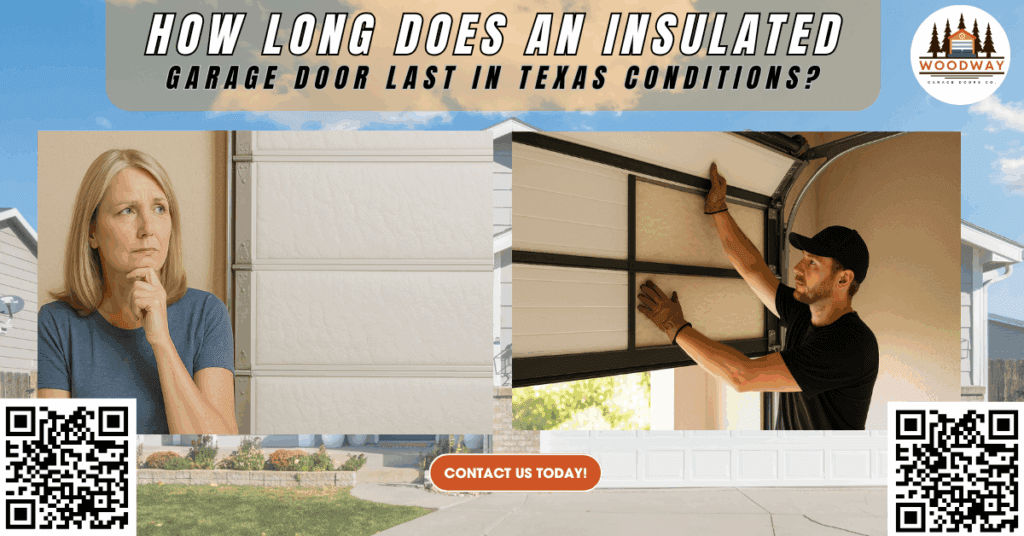When a homeowner in the Memorial area of Houston recently contacted us about their garage feeling unusually hot, even though they had an insulated garage door installed just over 15 years ago, we knew it was time for a full inspection. The polyurethane foam core inside the garage door panels had started to break down due to long-term exposure to Texas heat. Though the garage door insulation had done its job for well over a decade, the temperature extremes had begun to affect its efficiency.
Here’s a surprising fact: a properly installed and maintained insulated garage door can last between 15 and 30 years, depending on the material, weather exposure, and upkeep. In a climate like Houston’s, where the mercury frequently climbs past 90°F in the summer and occasionally dips below freezing in winter, your garage door must withstand a wide range of temperatures and humidity. That makes choosing the right insulation type, door material, and maintenance plan critical for longevity.
At Woodway Garage Doors Co., we’ve served Houston and surrounding communities for years, helping both residential and commercial clients make the best investments for their homes and businesses. If you’ve ever wondered how long your insulated garage door will last in the unpredictable Texas climate, or how to make it last longer, this guide is for you.
What Is an Insulated Garage Door?
An insulated garage door is more than just a standard barrier between your garage and the outdoors. It consists of multiple layers, often steel or aluminum, that sandwich insulation materials like polyurethane or polystyrene foam. These materials act as a thermal barrier to reduce heat transfer into and out of your garage space.
There are different insulation types commonly used in insulated garage doors:
- Polyurethane: Offers superior r-values (a measure of thermal resistance) and excellent strength. It expands to fill the door panels, creating dense, thick insulation that significantly reduces thermal transfer.
- Polystyrene: Usually available in solid panels that are inserted between the door layers. While it provides good insulation, it’s not as efficient as polyurethane.
- Fiberglass: Less commonly used, but can provide decent noise reduction and heat insulation in custom applications.
The R-value of an insulated garage door indicates how well it resists heat flow. The higher the r-value, the better the insulation. In Texas, we recommend garage doors with an r-value of 12 or higher to combat the heat and humidity. For reference, non-insulated doors or single-layer doors have an r-value of 0 to 3, which offers minimal protection.
Popular options like Clopay garage doors, Amarr garage doors, Martin garage doors, and Craftsman garage doors come in both insulated and non-insulated models, giving homeowners plenty of choices based on their budget, aesthetic preferences, and energy needs.
Factors That Affect Lifespan in Texas
1. Weather and Climate Challenges
Houston’s humid subtropical climate is tough on exterior home products. Garage doors must deal with high humidity, direct sunlight, sudden storms, and rapid temperature changes. These extremes can cause materials to expand, contract, or warp. Poor-quality insulation, especially styrofoam or cheaper door insulation kits, may deteriorate quickly in such conditions.
Sectional doors with high U-value (a measure of heat transfer, opposite of R-value) will allow more heat into your garage, increasing your cooling costs. Over time, thermal transfer also degrades the efficiency of your garage insulation, causing your energy bills to rise, an issue we’ve seen repeatedly during Houston summers.
2. Insulation Material and Door Type
Different garage door materials age differently in Texas:
- Steel insulated garage doors with polyurethane cores are incredibly durable and resistant to warping, lasting 20–30 years with proper maintenance.
- Aluminum doors are lightweight and rust-resistant but may not insulate as well unless paired with a high r-value foam core.
- Fiberglass composite doors offer aesthetic value and decent insulation but require sealing to protect against moisture infiltration.
- Wood doors, though beautiful, need constant upkeep and aren’t ideal unless paired with modern insulation materials and sealed frequently.
Your choice of garage door type, whether single door, sectional, or custo,m and its insulation kit quality will go a long way in determining lifespan.
3. Frequency of Use
Every time you hit your garage door opener or the logic board triggers the light socket, mechanical parts like rollers, tracks, and springs go to work. In high-use households, even an insulated door will experience wear and tear.
While the panels and insulation may last 25+ years, components like:
- Garage door openers
- Springs
- Cables
- Hinges
…may need to be replaced every 7–12 years, depending on use and quality.
4. Maintenance Routine
Regular maintenance is crucial. You should:
- Inspect your garage door panels and insulation materials every 6 months.
- Lubricate all moving parts quarterly.
- Replace weather stripping and door seals when worn.
- Check for gaps in the insulated door panels and look for mold or rust.
Proper care can help your garage door insulation perform efficiently for decades.
Common Signs You Need a Replacement
If you’re experiencing these issues, it may be time for a new garage door:
- Panels appear warped, dented, or sagging
- Sudden temperature spikes in your garage space
- The door makes loud noises despite the garage door insulation
- Energy costs are increasing with no other explanation
- You’ve needed repeated garage door repairs within the last year
The initial cost of a replacement can feel high, but the energy savings, noise reduction, and added property value often deliver a strong return on investment.
How to Make Your Insulated Garage Door Last Longer
Maximize the lifespan of your insulated garage with these proven steps:
- Choose the right insulation type: Opt for polyurethane over Styrofoam for better energy efficiency and durability.
- Use high-quality products: Invest in brands like Clopay, Amarr, or Martin for superior garage door insulation and components.
- Regular maintenance: Schedule annual tune-ups with a garage door technician. At Woodway Garage Doors Co., we inspect all moving parts, test the garage door opener, and check your insulation’s R-values.
- Upgrade components: Replace older logic boards, springs, or rollers with modern, longer-lasting parts.
This simple step-by-step guide can save you thousands in repairs or replacements and preserve your home’s energy efficiency.
Why Insulated Garage Doors Are a Smart Investment in Texas
Here’s why more Houston homeowners are switching to insulated garage doors:
- ✅ Energy Savings: Reduce energy loss from your garage, especially if it’s connected to your home or used as a workspace.
- ✅ Temperature Control: Keeps your garage space cooler in the summer and warmer in winter, protecting your car, tools, or appliances.
- ✅ Noise Reduction: Insulation materials help block noise from outside and reduce vibration from your garage door opener.
- ✅ Enhanced Durability: Thicker panels resist dents, warping, and rust.
- ✅ Curb Appeal: A new, well-insulated door enhances your home’s appearance and increases property value.
When it comes to choosing between insulated vs. non-insulated doors, the long-term benefits of energy savings, quiet operation, and comfort make insulated garage doors the clear winner.
How Can Woodway Garage Doors Co. Help You?
At Woodway Garage Doors Co., located at 4900 Woodway Dr Ste 1110, Houston, TX 77056, we understand the specific demands Texas weather places on garage doors. Whether you’re installing a new garage door, replacing worn-out insulation, or repairing a garage door opener, our expert technicians deliver precision, quality, and peace of mind.
We proudly offer:
- 🛠️ Professional installation of insulated garage doors with top-tier polyurethane cores and high R-values
- 🔧 Repairs and upgrades for garage door insulation, openers, and logic boards
- 🔍 Annual tune-ups to preserve energy efficiency and extend door lifespan
- 🧰 Door insulation kits and full-service retrofitting for non-insulated doors
- 💬 Expert consultation to guide you on the best door types, materials, and insulation options for your unique needs
Call us today at (281) 984-6125 or visit our shop to discuss how we can help you improve your home’s energy efficiency, comfort, and property value—one garage door at a time.
Woodway Garage Doors Co. – The trusted name in garage door excellence for Houston and beyond.
Frequently Asked Questions (FAQs)
1. Can I insulate my existing garage door instead of replacing it?
Yes, you can use a garage door insulation kit to retrofit your current door, though it won’t be as effective as a factory-insulated garage door with polyurethane or polystyrene core.
2. Does insulation help with bugs or pests entering the garage?
Yes, proper insulation combined with weather stripping can help seal gaps and deter insects, rodents, and other pests from entering your garage.
3. Will an insulated garage door make my garage feel like an indoor room?
It can significantly reduce temperature swings, but without HVAC or additional wall/ceiling insulation, it won’t fully match the comfort of an interior room.
4. How do I know if my garage door’s insulation is still working?
If your garage feels unusually hot or cold, energy bills are rising, or you see cracks or deterioration in the panels, the insulation may be compromised.

